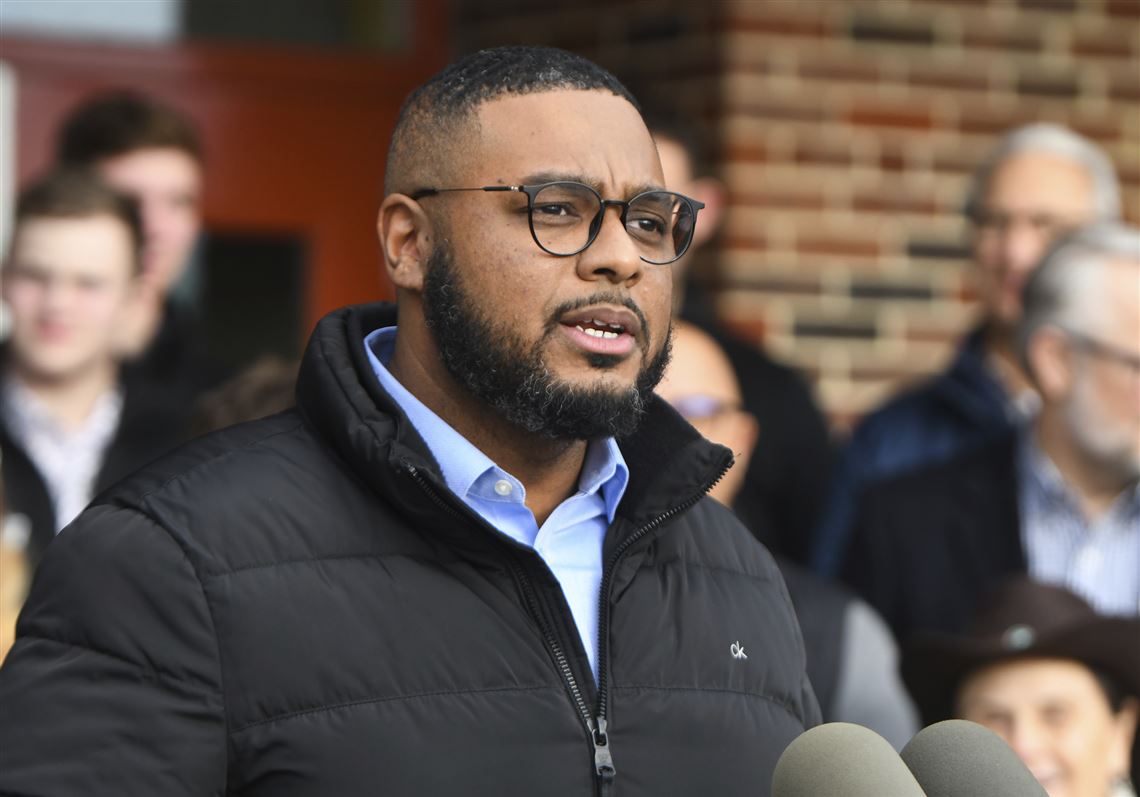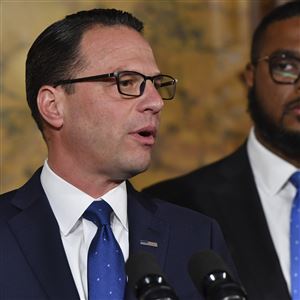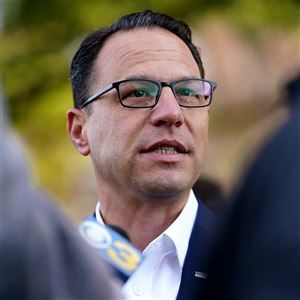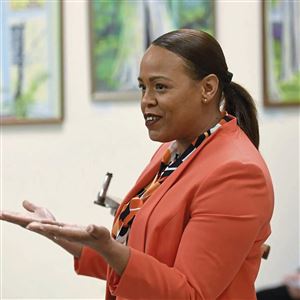When his McKeesport-based group wanted to try a new approach to addiction recovery, John Lydon knew it wouldn’t be easy. The plan was to care for entire families under the roof of one treatment center, including children neglected during their parents’ substance use.
Mr. Lydon needed a place to put the center.
He went to Austin Davis, then a state House member representing the district. He figured the lawmaker could make connections but might hesitate to lead the charge for a project that would bring families coping with addiction to a neighborhood. But Mr. Davis became a fast champion of the effort, Mr. Lydon said. Construction finished last month on the Auberle Family Healing Center in Mt. Oliver borough.
“Everybody he talked to got back to me, gave me their cell,” said Mr. Lydon, CEO of Auberle, a nonprofit where Mr. Davis was a board member at the time. “People were very helpful and trusted what Austin had told them, that this should move forward.”
On Tuesday, Mr. Davis will become Pennsylvania’s first Black lieutenant governor, and one of the youngest. During two terms in the state House, Mr. Davis, 33, burnished a reputation as a humble, deliberate lawmaker more focused on results than popularity — traits that should help him and Gov.-elect Josh Shapiro govern in a divided Harrisburg, longtime colleagues, mentors and political watchers said.
“This is generally the kind of office where people end their political career or start riding off into the sunset,” said Kristen Coopie, a political analyst at Duquesne University. “But having someone so young in the office — he has a great opportunity to do something with it.”
Mr. Davis will tie fellow Democrat Mark Singel as the second-youngest among elected lieutenant governors, according to state Senate librarian Alexandra Barbush. William Scranton III was the youngest at 31 when he took office in 1979.
Growing up in McKeesport, Mr. Davis was an early leader who quickly found his way to student government, said Michael Cherepko, one of Mr. Davis’ former teachers and now the mayor.
“Just someone very responsible, conscientious about how he conducts himself,” Mr. Cherepko recalled. “You could see the leadership skills that he displayed even as a young boy. He was years ahead of himself.”
When he was McKeesport mayor, state Sen. Jim Brewster made Mr. Davis, then a high-schooler, a ceremonial deputy mayor. Now Mr. Davis will serve as president of the state Senate, one of the lieutenant governor’s only official duties in Pennsylvania. Others include chairing the Board of Pardons and serving on Pennsylvania Emergency Management Council.
Mr. Brewster said he has a personality “made for the job.”
“People tend to like him. If you talk to him, he lends an ear, and that’s important,” said Mr. Brewster, who worked with Mr. Davis in the legislature. “Sometimes all people want is for someone to listen to them.”
A spokesperson for Mr. Shapiro’s transition wouldn’t make Mr. Davis available for an interview last week. In his election night victory speech, Mr. Davis said he knows “what it’s like to come from a family that’s often had to get creative to make ends meet.”
“I also know, through the experience of my own life, that anything is possible when you give a child the resources they need coupled with an environment in which they can thrive,” he said in November. Because of his community, public school and teachers, “a kid from an old steel town often overlooked by the power brokers in Washington and Harrisburg was able to grow up to become the first Black state legislator outside of the City of Pittsburgh — and now Pennsylvania’s first Black lieutenant governor.”
He pledged to champion those working families who have felt “unseen, unheard and forgotten.”
How he fulfills that commitment hinges heavily on how he and Mr. Shapiro shape his job, which will pay $193,000 in 2023. The position is largely ceremonial, albeit first in the line of gubernatorial succession. Mr. Shapiro vowed after his election that Mr. Davis “will redefine the role of lieutenant governor.”
U.S. Sen. John Fetterman, whose four-year tenure as lieutenant governor ended this month, brought a more activist posture than his predecessors, said Daniel Mallinson, a professor of public policy and administration at Penn State Harrisburg. That was seen in his push for marijuana legalization and a significant increase in pardons and commutations granted by the Board of Pardons under his watch.
“If [Mr. Davis] wants to do what Fetterman did, he’s going to have to hold his own and sometimes probably push back against entities like the attorney’s general office,” Mr. Mallinson said. “That might pose a challenge.”
Mr. Fetterman did “a favor in highlighting some of those more contemporary issues that Mr. Davis will be willing to roll up his sleeves and take some action on,” said Kevin Carter, a Pittsburgh school board member.
“Mr. Davis is about delivering, less just talking about it but really identifying solutions,” Mr. Carter said.
The best man at Mr. Davis’ wedding, Mr. Carter said he was among the first to push his friend to run for statewide office.
“When you look at how Pennsylvania is structured — economically, culturally and socially — he touches a lot of backgrounds and understands a lot of different types of people to connect with them,” Mr. Carter said.
Kevin Acklin, a former Pittsburgh city official who has known Mr. Davis for more than a decade, expects him to use his role “as an activist to make positive change.”
“Austin will choose whatever that means for him,” said Mr. Acklin, a Pittsburgh Penguins executive and Shapiro transition team member.
Mr. Davis finished his undergraduate degree in political science in 2012 at the University of Pittsburgh and became an advisor to Allegheny County Executive Rich Fitzgerald. He brought the perspective of valley communities hit hard by industrial decline and population loss, Mr. Acklin said.
“Austin worked in county government but never lost his connection with the Mon Valley,” he said. “Some of those neighborhoods, and some of those communities, have not felt the recovery that, for example, Pittsburgh has.”
Mr. Shapiro, a former Montgomery County commissioner, “found a true partner” in his running mate, said Larry Ceisler, a longtime Pennsylvania public affairs executive.
“I think Josh looks at Austin as having lived a different life than he has, growing up and representing a different part of the state — and also being a protege of Rich Fitzgerald, who’s just had a tremendous run as county executive,” Mr. Ceisler said.
Mr. Davis won’t have “the sexiest of offices,” but a lot of its impact can be informal, said Ms. Coopie, the Duquesne professor. He can use a bigger platform to elevate issues that drove him as a lawmaker, such as economic inequality and gun violence, she said. And his relationships with former colleagues in the legislature could prove helpful if policy priorities run into Harrisburg gridlock bills run into legislative gridlock.
“He’s not in the sausage factory anymore,” Ms. Coopie said. “That’s OK because it’s very helpful to have an understanding of how that process works.”
Adam Smeltz: asmeltz@post-gazette.com, @asmeltz. Mike Wereschagin contributed.
First Published: January 17, 2023, 10:00 a.m.
Updated: January 17, 2023, 1:31 p.m.























